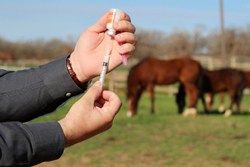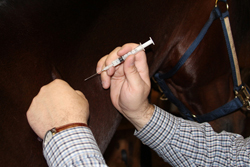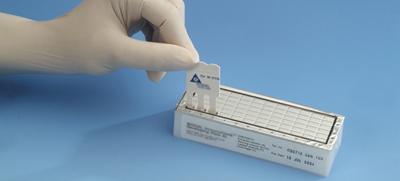Written by Mark DePaolo, DVM. COPYRIGHT © 2012 All rights reserved.
How do vaccines negatively affect my horse?
Vaccines can be an essential component of sound preventative medicine, but conscientious caretakers often lack a basic understanding of how vaccines impact the immune system, how they are effective and when they are necessary. While responsible vaccination can bolster a horse’s immune defense, overuse and unwarranted administration can reduce effectiveness and increase the risk of serious health issues. Thus, careful analysis and planning is essential to ensure the most effective and cost efficient vaccination protocol for each individual horse.
Like all aspects of sensible horse care, vaccination should not garner a one-size-fits-all approach. Special attention must be paid to several factors including a horse’s age, likely exposure and overall physical condition. Owners and caretakers should have a basic understanding of how the immune system works and the rationale behind vaccination, rather than adhering to the arbitrary schedule of annual or booster vaccines. Such a measured approach can reduce adverse reactions and side effects while maintaining a healthy and sound horse.

When considering the best approach to vaccination, it is essential to have a general grasp of the horse’s immune system and the role of immunization. Vaccines serve to stimulate a horse’s natural immune response, in an attempt to bolster protection against specific threats such as rabies, tetanus or West Nile Virus. By introducing a weakened (live-attenuated) or “killed” (inactivated) form of a pathogen, vaccines mimic infection and spur a targeted response.
Once this response is stimulated, antibodies remain in the body and the immune system retains the ability to recognize and combat the specific threat. These benefits are typically long lasting and can endure for years, if not a lifetime, depending on the individual. Without initial vaccination, horses would not have a strong immune response to many serious, life-threatening illnesses. The chance of exposure to widespread, potentially fatal illnesses underscores the benefits provided by responsible vaccination. However, vaccination should be approached with moderation and with very clear purpose.
What are the risks associated with vaccination?
In addition to their core component, live or killed pathogens, vaccines contain an adjuvant designed to enhance the immune response. These adjuvants typically act as irritants, inciting an amplified and accelerated response to the killed or weakened virus. Although relatively small in quantity, adjuvants, like mercury, arsenic and aluminum are foreign materials with potentially dangerous consequences. The body does not naturally purge heavy metals like mercury and aluminum – thus they continue to accumulate over a horse’s lifetime. Once these heavy metals accrue to relatively low levels, serious illness can occur, including neurologic disorder, kidney failure and colic or digestive distress. A lifetime of unwarranted vaccinations could, despite the best intentions, degrade health by increasing a horse’s toxic metal load.
Aside from the accumulation of toxic metals and other harmful agents, vaccination can produce a range of adverse reactions. These side effects include relatively superficial issues, like swelling, soreness, stiffness, and lethargy. However, on rare occasions, they can be as dangerous as anaphylaxis, deep muscle infections and laminitis. Anaphylaxis is a severe, allergic reaction that can be life threatening. Immediately following vaccination, the horse may become weak, tremble or collapse in shock. Without attentive care and the timely administration of epinephrine, the reaction can prove fatal.
Another serious side effect linked to vaccination involves the onset of acute laminitis. A 2003 study conducted by researchers from Texas A&M University suggests a link between routine vaccination and acute episodes in horses with chronic laminitis. According to the study, chronically laminitic horses have a heightened sensitivity to vaccines compared to healthy horses due to changes in their immune systems. The exact relation behind vaccine-triggered laminitis remains unclear. Horses with Cushing's Syndrome or insulin resistance, however, appear to be at higher risk.
How do I know what vaccines to give my horse?
Conscientious owners and caretakers must strike a delicate balance between cultivating a robust immune system and minimizing exposure to such heavy metals. This risk/reward evaluation requires individual consideration. Factors including age, lifestyle, environment and personality all shape a horse’s immune system and vaccination needs. As the American Association of Equine Practitioners (AAEP) notes, “A ‘standard’ vaccination program for all horses does not exist.” Each individual requires evaluation based on risk of disease, consequences of disease, vaccine effectiveness, potential for adverse reaction and the cost of immunization versus the potential cost of disease.
Aside from “core” vaccines, owners should carefully evaluate their horses and individual needs to ensure the safest and most effective vaccination protocol. According to the American Veterinary Medical Association (AVMA), core vaccines are those which “protect from diseases that are endemic to a region, those with potential public health significance, required by law, virulent/highly infectious, and/or those posing a risk of severe disease.” Core vaccines have demonstrated their effectiveness and offer enough benefit with a low enough risk to justify use. These “core” vaccines include rabies, tetanus and Eastern/Western Equine Encephalomyelitis.

Beyond these “core” vaccines, caretakers should consider a tailored approach to risk-based vaccination for diseases such as West Nile Virus, Rhinopneumonitis, Potomac Horse Fever and Strangles. According to the AAEP, the necessity for these vaccines “may vary regionally, from population to population within an area, or between individual horses within a given population.” Owners must consider each of these risk-based vaccines in terms of likely exposure and disease severity, versus vaccine effectiveness and safety. After careful consideration, caretakers should limit vaccination to only what is necessary and represents a measurable reward versus potential risk.
As an example, equine rabies is life threatening and incurable. The vaccine, however, has proven to be extremely effective – with one or two shots offering a lifetime of protection for most horses. In contrast, Rhinopneumonitis is typically non-fatal and fairly easily to treat with both conventional and alternative medicine. Yet the Rhinopneumonitis vaccine is notoriously ineffective, leading many veterinarians to suggest new vaccinations every few months. The vaccine is also often associated with adverse reactions, including swelling and muscle stiffness. Since the vaccine is fairly ineffective, stressful to the horse and the disease is not overly serious, the benefit, and thus the need to vaccinate, is quite low. Responsible caretakers should address each disease and vaccine through a similar lens of risk/reward as the foundation for an effective and safe vaccination protocol.
Another important consideration in responsible vaccination protocols involves timing. When making vaccination decisions, caretakers should study the disease and its prevalence during various times of the year. Mosquito-borne illnesses like Wes Nile Virus and Eastern/Western Equine Encephalomyelitis peak during late summer and early fall, when mosquito populations explode. For these late summer diseases, a late spring vaccination would prove considerably more useful and effective than administration in November or early February.
However, effective vaccination protocols require more than seasonal considerations. The best way to maximize vaccination benefits and minimize health risks is to spread vaccine administration out rather than overloading the immune system with multiple shots at once. If the immune system is at all weak, multiple vaccines given the same day may not be very effective and can amplify the risk for adverse reactions. In addition, vaccinations can overwhelm the immune system especially if it is weakened already by chronic disease. Thus, it is imperative that an ill or malnourished horse is never vaccinated and that injections are administered well in advance of stressful situations such as competition, extended trailering or extensive training. In fact, horses should not be vaccinated less than four weeks prior to shows, performance events, sales or domestic shipment. Some veterinarians may even elect not to vaccinate horses within three weeks of international shipment.
How do I know if my horse is protected from disease?
Drug companies do not test vaccines to see how long they are effective. As such, conducting titer tests on horses can help to avoid the cost and risk of annual vaccinations. These tests measure the presence and strength of antibodies related to specific pathogens and disease. Titers offer a useful indicator of humeral immunity, but are not the perfect answer to determining protection.

While titer tests measure the presence of antibodies in the blood stream, there are many other areas in which a vaccine can produce a protective response. For example, cellular immunity cannot be measured by simple titer tests. Some vaccine researchers believe that if any titer is detected, protection will extend to the cellular level.
Though imperfect, titers represent a critical tool for owners and veterinarians to obtain a general understanding of a horse’s base-line immunity and protection. Indeed, the American Veterinary Medical Association acknowledges that titers can serve as a measure to determine the need for revaccination, but does caution that the data is unclear. The best way to approach titers is as a general guide to a horse’s immune capabilities. If the titer ratios are favorable, there is no need for further vaccination. If the ratios are low or inconclusive, more deliberation is required to determine the need for immune stimulation through vaccination.
This information is for educational purposes only and should not be considered as Dr. DePaolo diagnosing your horse’s health. DePaolo Equine Concepts, Inc. recommends that you consult your regular veterinarian regarding specific health concerns.
Tips on vaccination risks:
- Responsible vaccination can bolster a horse’s immune defense but overuse and unwarranted administration can create the risk of serious health issues.
- There are several risks and side effects linked to vaccines and horses that have a pre-existing health condition are especially at risk.
- A ‘standard’ vaccination program for all horses does not exist therefore each individual horse requires evaluation based on risk of disease versus the potential for adverse reaction.
- Titer tests measure the presence of antibodies in the blood stream and can be used to detect virus immunity.

